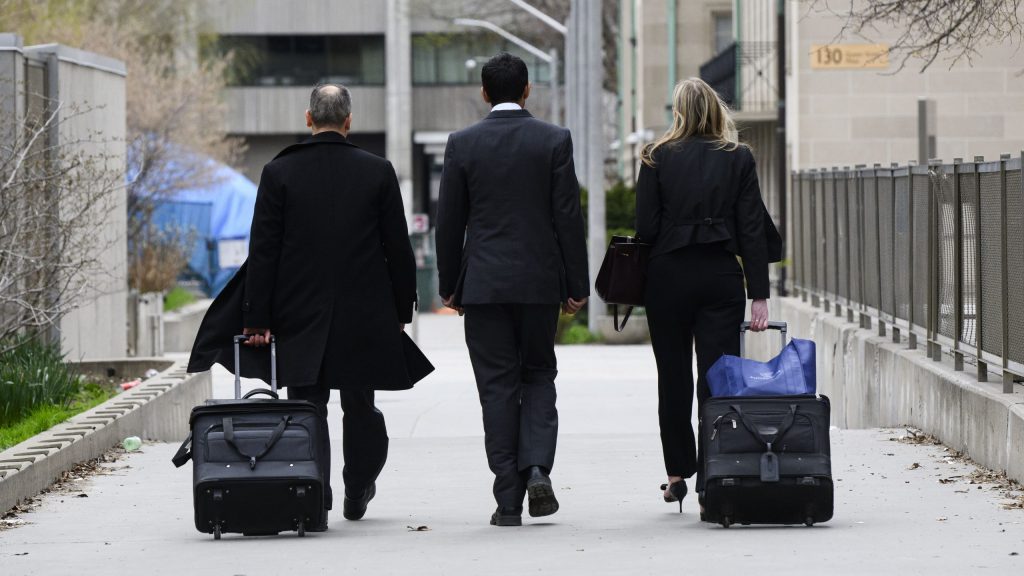WHO asks Canada to justify visa ban for residents of Ebola-affected countries
Posted November 4, 2014 6:25 pm.
This article is more than 5 years old.
The World Health Organization has asked Canada to justify its decision to limit travel to this country from the West African countries combating Ebola.
The federal government announced Friday it would not issue new travel visas for residents or citizens of countries with widespread and persistent Ebola transmission. As well, it has put a halt on the processing of permanent residency visas for people from those countries.
Canada’s move contravenes the International Health Regulations which stipulate that in infectious disease outbreaks, countries should not impose trade or travel sanctions against affected countries beyond what the WHO has recommended.
Under that treaty, countries which take measures that are stronger than those approved by the WHO must present the global health agency with the scientific and public health rationale for their actions.
The WHO has repeatedly urged countries not to close their doors to people from Guinea, Sierra Leone and Liberia, saying to do so would be counterproductive and might actually increase the risk of international spread of the disease.
“Any strong measures (like border closures) need to be well documented and explained to those who are suffering from those measures,” the WHO’s Dr. Isabelle Nuttall said Tuesday in an interview.
“And if not, they will just be circumvented. People will find a way to travel. And the consequence to a country might be even worse than not having had a travel ban.”
As well, she said, countries that have banned travel from affected nations may let down their guard. “What is important is to maintain the level of vigilance. What we wouldn’t want is that Canada feels that because of that, there is a false sense of security.”
Canada is a signatory to the International Health Regulations — often called the IHR. Nuttall is the head of the WHO’s department of global capacities alert and response, which is responsible for overseeing the implementation of the health security treaty.
Nuttall said the WHO has asked Canada’s IHR focal point — the person within the Public Health Agency of Canada tasked with communicating with the WHO on IHR-related issues — for an explanation. She wasn’t clear when the request was sent but said the WHO has yet to receive a reply.
The Public Health Agency of Canada said via email Tuesday night that as required, it had notified the WHO of its intention to limit access to Canada for people from affected countries. The email also said Canada would present the WHO with the requested rational “in the near future.”
Meanwhile, Kevin Menard, a spokesperson for Citizenship and Immigration and Minister Chris Alexander, said in an email that some exceptions to the new rules may be permitted.
“Should essential travel be required, it will be seriously considered. Discretion still remains to grant entry where travel is essential and in Canada’s interest,” Menard wrote. He did not say what would qualify as essential travel.
The treaty, which uses moral suasion rather than sanctions, is designed to increase global health security by removing disincentives for countries to report disease outbreaks that might threaten other nations if they go unchecked.
While the WHO will engage in discussion with Canada in the hopes the government will change its position, the treaty contains no sanctions for countries that contravene it. The document was drafted by countries, not the WHO, Nuttall said.
In the past countries have on occasion been loath to admit they have outbreaks of some diseases because other nations have responded by swiftly issuing travel bans and-or trade sanctions.
China took several months to admit it was in the grips of an outbreak of a deadly new disease in 2003, in the process unleashing that disease — SARS — on the world. An estimated 8,422 people in a number of different countries contracted SARS and the disease claimed 916 lives — 44 of them in Canada.
In fact, Canada helped to revise and update the IHR in the wake of the 2003 outbreak. It had an incentive; Canada had been hurt economically because it had the misfortune of having the largest SARS outbreak outside of Asia.
During SARS the WHO used “travel advisories” — warnings that people should postpone travel to SARS-affected countries or cities. Toronto, which was briefly under a travel advisory, saw hotels empty, conferences cancel and movie shoots relocate. The outbreak is estimated to have cost the city’s tourism industry $2 billion and led to an estimated 28,000 layoffs.
Preben Aavitsland, Norway’s former state epidemiologist and one of the drafters of the International Health Regulations, explains the purpose of the treaty this way:
“IHR offers a fair deal to any country: Tell us everything about your bad outbreaks and we will assist you and make sure you are not victims of unnecessary restrictions,” he said via an email.
“Well, now Canada has broken its part of the deal.”
Under the IHR, when a public health emergency of international concern is declared — Ebola was named one on Aug. 8 — the WHO can issue temporary recommendations aimed at helping contain the outbreak.
The WHO’s director general takes advice on whether to declare a public health emergency and what recommendations to make related to it from a team of experts appointed for that purpose. The group is called an emergency committee.
The Ebola emergency committee recommended against restricting travel from the Ebola-affected countries and has repeated that advice twice more since its original meeting. WHO Director General Margaret Chan has accepted that advice.
“We do not believe in the current circumstances travel bans can be efficient. And we don’t believe that the stopping of transmission of Ebola will be achieved by imposing a travel ban,” Nuttall explained.
Still, a number of countries have taken a range of actions that go beyond the WHO’s recommendations. Nuttall said to date 31 have levied some limitations on travellers from the affected countries.
The WHO and the United Nations have frequently complained these travel restrictions are impeding the world’s ability to respond to the outbreak by making it hard to get international health workers and needed equipment to the affected countries.
But Canada and Australia — which closed its borders to residents of the affected countries before Canada — are among the biggest names to take these steps. Other countries to impose travel restrictions include Rwanda, Cape Verde and Antigua and Barbuda.
Aavitsland said Canada and Australia are setting a bad example.
“This travel ban is far more than what is necessary to protect Canadians. What is needed is not abundance of caution, but the proper level of caution,” he wrote.
Some observers have noted that in 2003, Canada railed against travel restrictions. A delegation from the Ontario government — headed by then health minister Tony Clement, who is now an influential member of Prime Minister Stephen Harper’s cabinet — travelled to Geneva to demand the WHO rescind Toronto’s travel advisory.
Nuttall remembers vividly how annoyed Canadian officials were when the travel advisory was issued.
“I had the ‘privilege’ to be live on TV that day to announce the measures,” she recalls.
“And I can tell you that I had a very angry, very angry person in front of me and that I had to explain the WHO decision based on the scientific evidence that was presented by WHO at that time and why the decision was taken.
“Now it is important to note that the (revised) IHR were really developed for that not to happen any more.”
Over the weekend, Clement — now chairman of the treasury board — defended the government’s visa decision on Twitter, saying the move to close borders to people from Ebola-affected countries was different from the SARS travel advisory.
“We are a sovereign nation with a duty to protect our citizens,” he tweeted.










